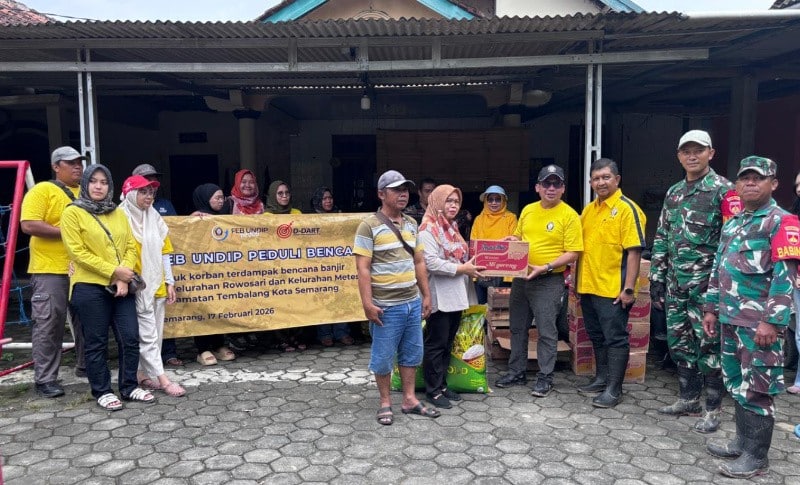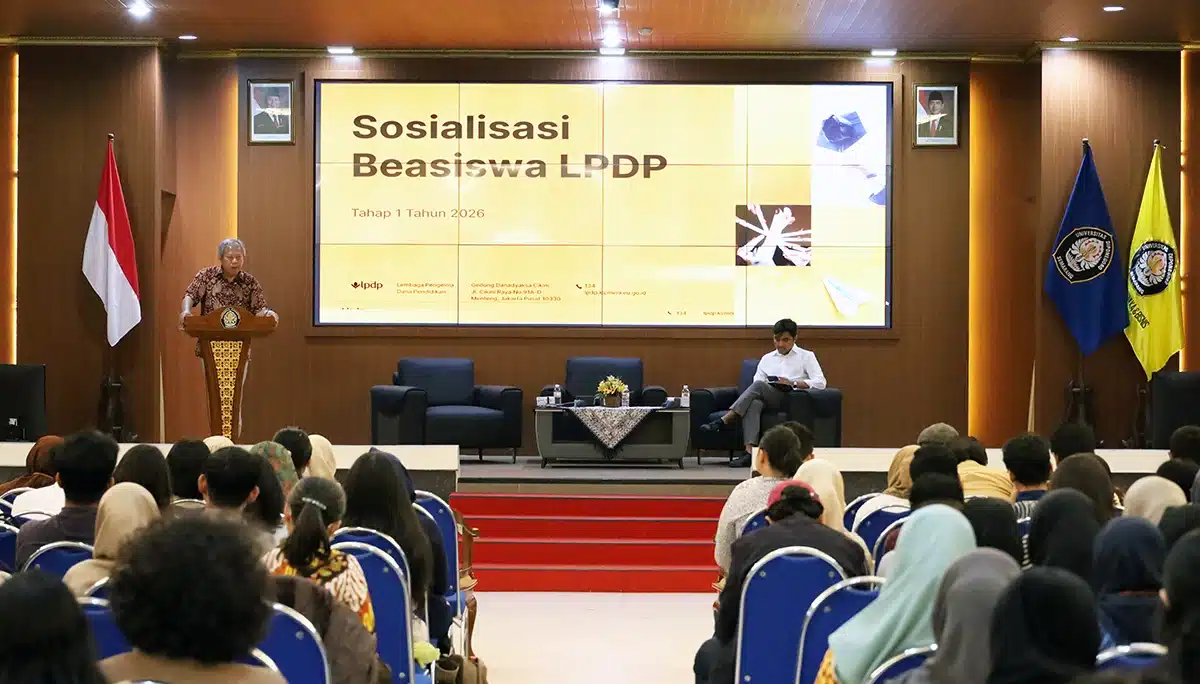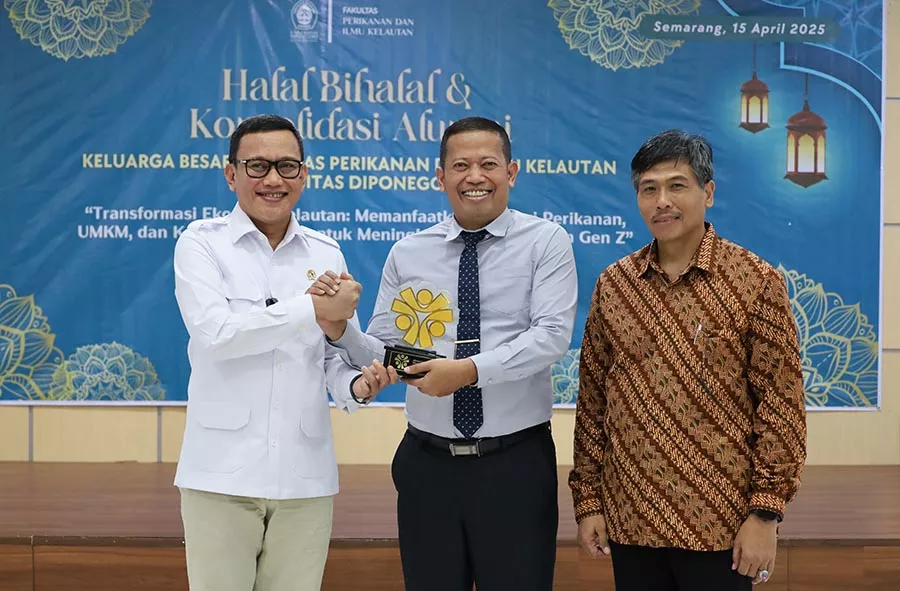UNDIP, Semarang (April 16) – In response to the demands of the disruption era, the Faculty of Fisheries and Marine Sciences at Universitas Diponegoro initiated an alumni consolidation forum themed “Marine Economic Transformation: Leveraging the Fisheries Industry, MSMEs, and Marine Conservation to Foster Gen Z Independence.”
Attending the event was Abdul Kadir Karding, S.Pi., M.Si., Minister for the Protection of Indonesian Migrant Workers and Head of BP2MI, who is also an alumnus of the Faculty of Fisheries and Marine Sciences and Chair of IKA UNDIP (UNDIP Alumni Association).
Held on Tuesday, April 15, 2025, at 12:00 PM at the Faculty of Fisheries and Marine Sciences UNDIP Auditorium, the Halal Bihalal event brought together faculty alumni and academic community members to strengthen collaboration and strategically advance the potential of the marine sector sustainably.
The event was attended by UNDIP Rector Prof. Dr. Suharnomo, S.E., M.Si., Dean of the Faculty of Fisheries and Marine Sciences Prof. Agus Trianto, S.T., M.Sc., Ph.D., lecturers, academic staff, and other members of the academic community. Minister Abdul Kadir Karding and his delegation were present as guests of honor.
The program began with the recitation of the holy Qur’an by Endra Balindra Zuhdi and Ahmad Zaidan Yusron’ Alam, followed by a religious sermon from Ustadz Agus Setiawan Al Hafidz. It concluded with a joint prayer led by Dr. Abdul Kohar Mudzakir.
In his opening remarks, Minister Abdul Kadir Karding emphasized the need for a significant transformation in the governance of Indonesian migrant worker placement. The government is currently pursuing comprehensive reforms in regulations, services, and vocational education curricula.
“Governance reform, including regulatory changes, is crucial to ensure that Indonesian migrant workers depart through legal channels. No more going through brokers. About 95% of workers who suffer from abuse, document confiscation, and deportation are those who went abroad illegally,” said Minister Abdul Kadir Karding.
Beyond legality, skill development is also a key focus. The Minister emphasized that migrant workers must undergo basic safety training and prioritize vocational education graduates to be more competitive in the global job market. Vocational education curricula must be aligned with the needs of destination countries. Additionally, service integration is continuously improved to create synergy between education, training, and job placement.
“Another often-overlooked issue is mental preparedness. Many workers fail to adapt abroad because they are not mentally ready. This issue must be addressed moving forward,” he added.
As of April 2025, labor demand from 100 countries has reached 1.7 million workers. Minister Abdul Karding views this as a major opportunity to absorb Indonesia’s productive workforce. “The solution is to shift the mindset. Working abroad is a strategic choice—as long as it’s done legally and supported by the right skills,” he said.
He also highlighted the importance of knowledge and skills transfer from returning Indonesian migrant workers so that their international experience can benefit the wider community and nation. “Labor issues, unemployment, and family economic challenges can partly be addressed by encouraging youth to work abroad. The way forward is by adapting university, vocational high school, and polytechnic curricula to meet foreign job market demands,” he concluded.
On the same occasion, UNDIP Rector Prof. Dr. Suharnomo, S.E., M.Si., emphasized the importance of higher education institutions being prepared to face the disruptive and turbulent era that has become a global issue.
Quoting former Nokia CEO Stephen Elop, who said that his company made no mistakes but was still sold to Microsoft for USD 7.2 billion, Suharnomo stressed that disruption is real and can impact anyone—including educational institutions. “There are many smart people on campus. But that’s where the challenge lies. The hardest place to change is the university. We’ve been in the comfort zone for too long,” he said.
He pointed out that several study programs have remained stagnant over the years while industries have rapidly adapted to change. “We’re in the disruption era, and ironically, it’s an industry that’s responding the fastest. Education is barely changing,” he added.
In the spirit of transformation, Prof. Suharnomo encouraged the Faculty of Fisheries and Marine Sciences to move quickly and take the lead. “We are the only university with access to the sea—at the Teluk Awur Jepara campus. That’s a tremendous advantage. This faculty should be UNDIP’s pride, and the Faculty of Fisheries and Marine Sciences must be on the frontlines,” he asserted.
Referring to the World Economic Forum, he mentioned four key future sectors: business mindset, information technology, renewable energy, and food & science technology. “The Faculty of Fisheries and Marine Sciences holds a strategic position to address these challenges, particularly in fishery product technology. This campus should be the top choice—it has real advantages. Now is an extraordinary moment. I’m waiting for your action. It is a great opportunity because alumni are reconnecting with the university. Let’s produce highly competent graduates. Let’s make the Faculty of Fisheries and Marine Sciences to be great again,” he said.
Meanwhile, the Dean of the Faculty of Fisheries and Marine Sciences, Prof. Agus Trianto, S.T., M.Sc., Ph.D., invited all students, faculty, staff, and alumni to embrace this moment as a collective spirit to realize the vision of making FPIK Great Again. With guidance from alumni and support from senior members, the faculty is optimistic it can become one of the most sought-after programs. “Indonesia has vast seas and an incredible coastline. Yet, we have not maximized this potential for public welfare, so this is our collective task,” he stated.
Prof. Agus also outlined strategic plans, including enhancing the relevance of graduates to meet global labor market demands. “Alumni are pushing us to continue adapting to the skills needed overseas,” he said.
Chair of the Faculty of Fisheries and Marine Sciences UNDIP Alumni Association (IKA FPIK), Dr. Ir. Djoko Hartoyo, S.T., M.Mar.Sc., IPU., emphasized the importance of building strong synergy between alumni and the university to tackle both domestic and international challenges and opportunities in the fisheries and marine sector. With this spirit, IKA FPIK is ready to collaborate actively in various strategic initiatives with the Faculty of Fisheries and Marine Sciences UNDIP.
With broad alumni networks and strong institutional commitment, the Faculty of Fisheries and Marine Sciences UNDIP is expected to grow, adapt, and produce graduates ready to compete globally. “InsyaAllah, we will host more joint events in the future, consolidated and realized through meaningful partnerships with the Faculty of Fisheries and Marine Sciences UNDIP,” he concluded.
The event concluded with a symbolic presentation of UNDIP jackets to two undergraduate students in Fishery Product Technology—Putri Muna Parenti and Tafeta Praudila Trisna—who will participate in a student exchange program in Japan.









